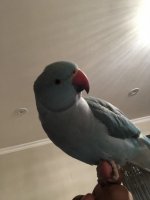_aryxn_
Meeting neighbors
- Joined
- 1/18/19
- Messages
- 40
- Real Name
- Aryan
Ringneck still scared of my hand!
I have an Indian Ringneck that I got when it was around 8 weeks or 2 months old. He is currently 9 months old. He can talk, He can whistle and sometimes sing too! He is generally friendly (other than his really annoying cage aggression), He is not very cuddly but sometimes he does let me cuddle with him like he is a cockatoo but that is extremely rare and happens once every 2 months.
Anyways, the problem that I have is that he is scared of my hand and seems to have an extreme fear of it at times. Usually, my hand can stay close to him if it's in front of him and he clearly can see it, but the problem arises when it is behind him, on top of him, close to his tail and near his wings. He also now won't step up more than once at a time and fly off and hide! This is because I have tried to make him gain some trust by doing step up training which he won't even do anymore half the times.
I don't see much progress if any to be honest as it seems like he will never fully understand my hand is not a threat and knows how to respect his boundaries (for him his boundary is not being touched when he isnt in a cuddly mood) I need help as I really don't want to sell or give him away as I really want him to like me as I like him a lot but it is being really frustrating and problematic


Rio
Last edited: 2 minutes ago
I have an Indian Ringneck that I got when it was around 8 weeks or 2 months old. He is currently 9 months old. He can talk, He can whistle and sometimes sing too! He is generally friendly (other than his really annoying cage aggression), He is not very cuddly but sometimes he does let me cuddle with him like he is a cockatoo but that is extremely rare and happens once every 2 months.
Anyways, the problem that I have is that he is scared of my hand and seems to have an extreme fear of it at times. Usually, my hand can stay close to him if it's in front of him and he clearly can see it, but the problem arises when it is behind him, on top of him, close to his tail and near his wings. He also now won't step up more than once at a time and fly off and hide! This is because I have tried to make him gain some trust by doing step up training which he won't even do anymore half the times.
I don't see much progress if any to be honest as it seems like he will never fully understand my hand is not a threat and knows how to respect his boundaries (for him his boundary is not being touched when he isnt in a cuddly mood) I need help as I really don't want to sell or give him away as I really want him to like me as I like him a lot but it is being really frustrating and problematic



Rio

Last edited: 2 minutes ago


 .
.